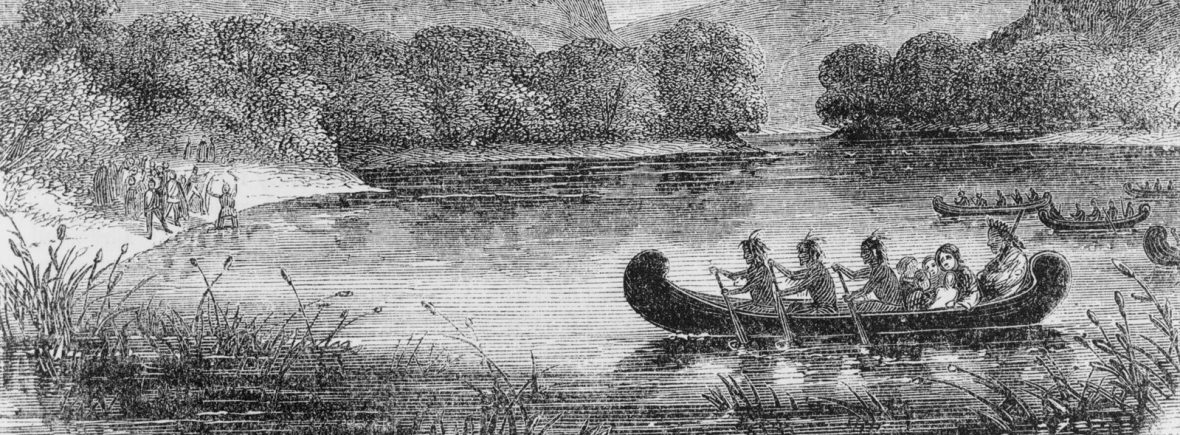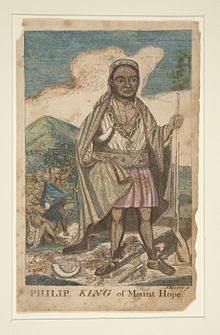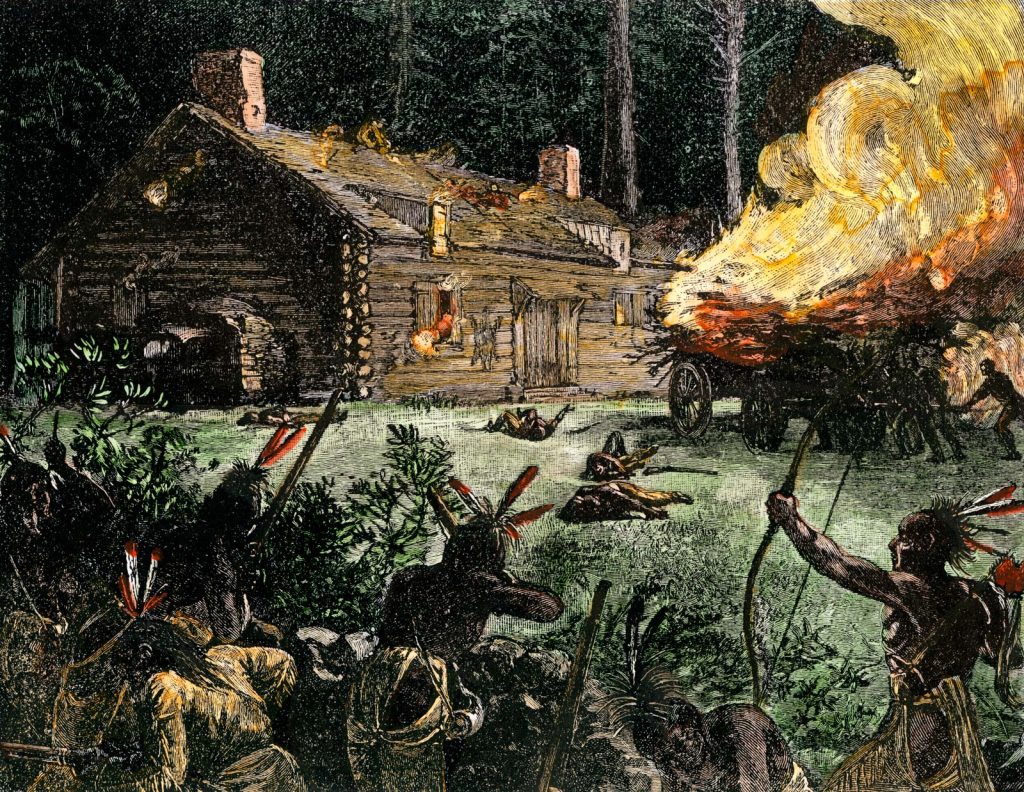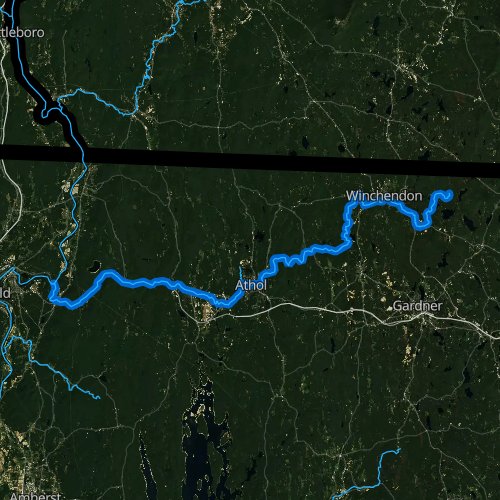Edited by Jaycee Robinson
I can but admire to see the wonderful providence of God in preserving the heathen for further affliction to our poor country.
— Mary Rowlandson
“The night before the letter came from the council,1 I could not rest, I was so full of fears and troubles, God many times leaving us most in the dark, when deliverance is nearest.2 Yea, at this time I could not rest night nor day. The next night I was overjoyed, Mr. Hoar being come, and that with such good tidings.3 The third night I was even swallowed up with the thoughts of things, viz.4 that ever I should go home again; and that I must go, leaving my children behind me in the wilderness; so that sleep was now almost departed from mine eyes.5
On Tuesday morning they called their general court (as they call it) to consult and determine, whether I should go home or noAnd they all as one man did seemingly consent to it, that I should go home; except Philip, who would not come among them.6
But before I go any further, I would take leave to mention a few remarkable passages of providence, which I took special notice of in my afflicted time.7
1. Of the fair opportunity lost in the long march, a little after the fort fight, when our English army was so numerous, and in pursuit of the enemy, and so near as to take several and destroy them, and the enemy in such distress for food that our men might track them by their rooting in the earth for ground nuts, whilst they were flying for their lives. I say, that then our army should want provision, and be forced to leave their pursuit and return homeward; and the very next week the enemy came upon our town, like bears bereft of their whelps, or so many ravenous wolves, rending us and our lambs to death.8 But what shall I say? God seemed to leave his People to themselves, and order all things for His own holy ends. Shall there be evil in the City and the Lord hath not done it? They are not grieved for the affliction of Joseph,9 therefore shall they go captive, with the first that go captive. It is the Lord’s doing, and it should be marvelous in our eyes.
2. I cannot but remember how the Indians derided the slowness, and dullness of the English army, in its setting out. For after the desolations at Lancaster and Medfield,10 as I went along with them, they asked me when I thought the English army would come after them? I told them I could not tell. “It may be they will come in May,” said they. Thus did they scoff at us, as if the English would be a quarter of a year getting ready.
3. Which also I have hinted before, when the English army with new supplies were sent forth to pursue after the enemy, and they understanding it, fled before them till they came to Banquang river,11 where they forthwith went over safely; that that river should be impassable to the English. I can but admire to see the wonderful providence of God in preserving the heathen for further affliction to our poor country.12 They could go in great numbers over, but the English must stop. God had an over-ruling hand in all those things.13
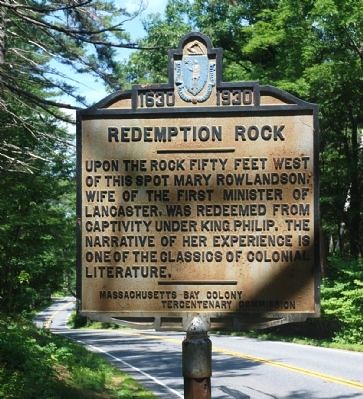
4. It was thought, if their corn were cut down, they would starve and die with hunger, and all their corn that could be found, was destroyed, and they driven from that little they had in store, into the woods in the midst of winter; and yet how to admiration did the Lord preserve them for His holy ends, and the destruction of many still amongst the English! strangely did the Lord provide for them; that I did not see (all the time I was among them) one man, woman, or child, die with hunger.14 Though many times they would eat that, that a hog or a dog would hardly touch; yet by that God strengthened them to be a scourge to His people.”15, 16
A concession to the novel “The Sovereignty and Goodness of God” (1682) by Mary Rowlandson and of the opportunity to both edit and collaborate on this text with the English 348 class of the Fall 2020 semester at Vancouver Island University, but most importantly, a sincere form of recognition and acknowledgement of the multitude of cultures, religions, traditions, lands, ecological knowledge and millions of Indigenous lives lost throughout the centuries of violent colonization, and to those whose lives are still lost at the hands of colonization, racism, oppression, prejudice, and trauma today.
The council Rowlandson is referring to was formed by various Indigenous leaders who were discussing whether or not they would release her from captivity. Rowlandson’s husband ended up trading 20 pounds to the council in exchange for his wife’s freedom. ↩
Rowlandson, a devout Puritan, discusses her faith continuously throughout the novel. Puritans were English Protestants who believed that there were errors regarding leadership and beliefs within the Catholic Church. For more information on Puritan faith, please visit: en.wikipedia.org/wiki/Puritans ↩
Rowlandson is referring to John Hoar, a militia leader & Indigenous liaison in colonial Massachusetts during King Philip’s War. Hoar is known for ensuring Rowlandson’s release from captivity. For more information on John Hoar, please visit: en.wikipedia.org/wiki/John_Hoar ↩
“Viz” is a term that originated from Britian. It is used to indicate a forth-coming explanation; an abbreviation of “videlicet.” ↩
Rowlandson is referring to her three children. Her youngest, Sarah, was 6-years-old when she succumbed to her wounds and buried by the Nashaway people in the woods. Mary, 10, and Joseph, 13, were both captured, as well, and held captive in separate Indigenous settlements until they were released. ↩
King Philip was the adopted English name of Chief Metacom, the sachem (chief) of the Wampanoag people in the United States during the seventeenth-century. For more information on King Philip, please visit: en.wikipedia.org/wiki/Metacomet ↩
Rowlandson was captured by a Nashaway chief, Monoco, although he was known to the English as “One-Eye John,” and was held captive for over eleven weeks, setting up camp with the Nashaway group twenty times. For information on the route Rowlandson is speculated to have traveled, please visit: www.arcgis.com/apps/MapJournal/index.html?appid=b76736c91d7d487c8ee7cc31f7a7675b ↩
Rowlandson is referring to her capture by the Nashaway people and their attack on Lancaster during King Philip’s war. The Indigenous group reportedly killed 12 colonists during this raid. For more information on King Philip’s War, please visit: en.wikipedia.org/wiki/King_Philip%27s_War ↩
Rowlandson’s third child, her first-born son, Joseph, who was 13-years-old at the time. ↩
Rowlandson is referring to the Lancaster Raid during King Philip’s War. ↩
The Banquang River is located in northern Massachusetts and is now known as Millers River. The name of this river was originally influenced by the Nipmuc word Baqua, meaning “clear-water.” ↩
Rowlandson remarks that God is allowing the Indigenous peoples to continue their “assault” on the British, further calling it “our country,” as if it belongs to English colonists and that settlers were not the ones invading Indigenous lands. For more information on the colonization of the Americas, please visit: en.wikipedia.org/wiki/British_colonization_of_the_Americas ↩
Rowlandson believes that rather than the traditional ecological knowledge and experience the Indigenous group had, it was actually the will of God that allowed them to cross the river successfully. For important information on traditional ecological knowledge, please visit: www.fws.gov/nativeamerican/pdf/tek-fact-sheet.pdf ↩
Rowlandson is shocked that Indigenous groups have not starved as colonists had notoriously done everything in their power to destroy the food supplies, believing that the lack of starvation among Indigenous groups and the continuous deaths of many colonists is God’s doing. For more information on the destruction of colonization on Indigenous food systems, please visit: www.indianz.com/News/2018/08/27/chelsey-luger-colonization-destroyed-nat.asp ↩
Rowlandson is insinuating that the Indigenous group she is with survives off of food that she deems “disgusting,” stating that a pig or a dog would not even eat it. This claim made by Rowlandson is made entirely by means of ethnocentrism and racist ideologies. Indigenous groups had a plethora of rich resources when it came to food systems, having immense knowledge and a deep understanding of subsistence practices, but due to colonization these food systems were stripped away. ↩
Rowlandson is claiming that white Christians are God’s people and that He is allowing Christians to fall “victim” of Indigenous groups. ↩

